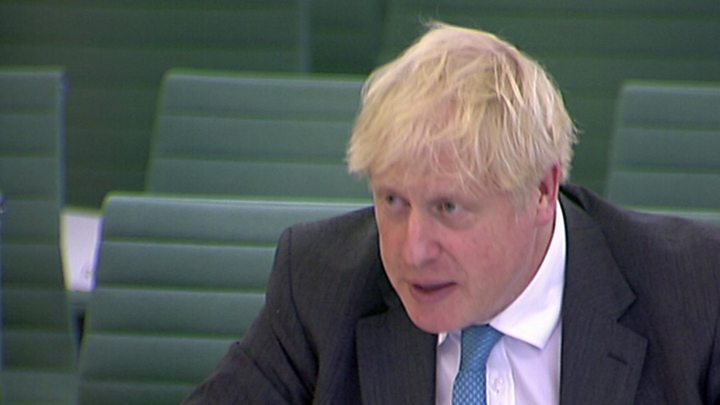 Image copyright
Getty Images
Image copyright
Getty Images
Government plans to amend a controversial bill that overrides sections of the Brexit divorce deal have been rejected by former Tory leader Lord Howard.
The peer said the compromise between No 10 and Tory MPs "isn't enough" for him to back it in the House of Lords.
The proposed changes would hand the Commons a say before powers to break international law could be used.
MPs will vote on them next week, before the bill heads to the Lords.
Boris Johnson reached a deal with Conservative MPs on Wednesday, in a move to head off a potential rebellion from its backbenchers over the Internal Market Bill.
On Wednesday Lord Keen, Scotland's Advocate General, became the second senior government legal officer to quit over the bill.
The government has now published an amendment to the bill, which would prevent ministers from activating new powers it gives them to override the Brexit divorce deal until MPs had voted to approve it first.
The change is similar to those proposed by senior Tory backbencher Sir Bob Neill, who will now drop an amendment he had planned on the issue.
Ministers have also tabled amendments to the bill that would place a time-limit on any attempts to question the legality of the controversial sections by judicial review.
'Matter of principle'
But Lord Howard, who was Conservative leader between 2003 and 2005, told the BBC: "The government is still asking Parliament to break international law."
He added that even with the government's proposed changes, the chances of the bill being approved by the House of Lords were currently "not great."
Asked if the matter could lead to a stand-off between the Commons and the Lords over the issue, he said: "I think it may go beyond that".
"I don't know what my colleagues will do, but as far as I'm concerned this is a matter of principle," added the Brexit-backing peer.

Media playback is unsupported on your device
However the government's changes to bill were welcomed by senior Tory backbencher Sir Roger Gale, who had threatened to vote against it if no changes were made.
In a tweet on Thursday, he wrote: "Good that Bob Neill's amendment, which I endorsed, has effectively been accepted."
Mr Johnson has argued the new powers in the bill are only required as a "legal safety net" in case ongoing talks with the EU over detailed arrangements for the Irish border break down.
In a policy paper published on Thursday, the government said the powers would only be triggered if the EU undermined the "fundamental purpose" of these negotiations.
It listed examples of what it said would constitute such behaviour, including if the EU insisted on export declarations for goods sent to Great Britain from Northern Ireland.
It also pledged that if it did decide to use powers to override the Brexit divorce deal, it would begin formal dispute settlement talks with the EU at the same time.
On Wednesday, Labour said it would continue to opposed the legislation when it is put to a vote in the Commons.
Speaking after No 10's deal with Tory MPs was announced, shadow business secretary Ed Miliband said: "This does not fix the problem of breaking the law, damaging our reputation around the world and damaging our future prosperity."
Defending the bill on Wednesday, the prime minister said he believed the EU may not be negotiating with the UK in good faith during talks over a post-Brexit trade deal.
September ultimatum
Informal talks on a trade agreement are continuing in Brussels this week, ahead of another full-scale negotiation round later this month.
However the EU has reacted angrily to the bill, threatening legal action and the possible suspension of trade talks if the measures overriding the withdrawal agreement are not withdrawn.
Asked to comment on the government's planned changes to the legislation, the European Commission said it would not comment on "internal discussions" between British ministers and MPs.
However chief spokesman Eric Mamer said an EU request for the UK to withdraw the sections of the bill before the end of September "has not changed".
On Mr Johnson's claim the EU had not been negotiating in good faith, he said agreements the EU had struck with countries around the world showed the bloc had a "rather splendid track record" in this area.
He added that the EU's chief Brexit negotiator Michel Barnier had demonstrated he could negotiate in good faith, even on "politically sensitive issues", during talks to conclude the UK's withdrawal deal, which entered into force in February.
What is the Internal Market Bill?
The bill sets out rules for the operation of the UK internal market - trade between England, Scotland, Wales and Northern Ireland - after the end of the Brexit transition period in January.
It proposes:
No new checks on goods moving from Northern Ireland to the rest of Great Britain Giving UK ministers powers to modify or "disapply" rules relating to the movement of goods that will come into force from 1 January if the UK and EU are unable to reach an alternative agreement through a trade deal Powers to override previously agreed obligations on state aid - government support for businesses.The bill explicitly states that these powers should apply even if they are incompatible with international law.
Ministers say the legislation is needed to prevent "damaging" tariffs on goods travelling from the rest of the UK to Northern Ireland if negotiations with the EU on a free trade agreement fail.

 5 years ago
740
5 years ago
740 

